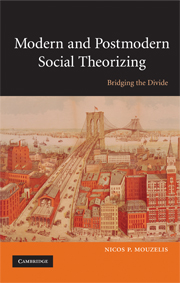Book contents
- Frontmatter
- Contents
- List of figures
- Acknowledgements
- Introduction
- Part I The theoretical background: the development of the agency–structure problematic
- Part II Parsonian and post-Parsonian developments
- 2 Parsons and the development of individual rights
- 3 Evolution and democracy: Parsons and the collapse of communism
- 4 Post-Parsonian theory I: neo-functionalism and beyond
- 5 Post-Parsonian theory II: beyond the normative and the utilitarian
- Part III Agency and structure: reworking some basic conceptual tools
- Part IV Bridges between modern and late/postmodern theorizing
- Part V Towards a non-essentialist holism
- Instead of Conclusion: Twelve rules for the construction of an open-ended holistic paradigm
- Appendix: In defence of ‘grand’ historical sociology
- References
- Index
3 - Evolution and democracy: Parsons and the collapse of communism
Published online by Cambridge University Press: 05 June 2012
- Frontmatter
- Contents
- List of figures
- Acknowledgements
- Introduction
- Part I The theoretical background: the development of the agency–structure problematic
- Part II Parsonian and post-Parsonian developments
- 2 Parsons and the development of individual rights
- 3 Evolution and democracy: Parsons and the collapse of communism
- 4 Post-Parsonian theory I: neo-functionalism and beyond
- 5 Post-Parsonian theory II: beyond the normative and the utilitarian
- Part III Agency and structure: reworking some basic conceptual tools
- Part IV Bridges between modern and late/postmodern theorizing
- Part V Towards a non-essentialist holism
- Instead of Conclusion: Twelve rules for the construction of an open-ended holistic paradigm
- Appendix: In defence of ‘grand’ historical sociology
- References
- Index
Summary
In the previous chapter, I argued that Parsons' attempt to link institutional differentiation with exclusively balanced, democratic forms of integration led him to overlook the possibility that unbalanced, authoritarian forms of differentiation/integration can achieve both durability and increased adaptive capacity. In this chapter I examine another way by which Parsons has tried to link differentiation/modernization with the prevalence, in the longue durée, of democratic forms of integration/governance.
A standard comment in relation to the democratic revolution in Eastern Europe is that nobody in the social sciences managed to foresee the spectacular collapse of the collectivist regimes in those countries and/or theoretically explain what brought it about. In this respect, Parsons, for years the bête noire of radical and Marxist sociology, is the one conspicuous exception. In an article published in the 1960s (Parsons, 1964a), he developed a set of evolutionist notions that throw some light on the cataclysmic changes experienced since 1989 by Eastern European societies.
Evolutionary universals
In his late work, Parsons tried to inject his structural-functionalist approach with some dynamism by integrating it with a neo-evolutionist perspective (Parsons, 1964a, 1966). Central to this perspective are the notions of structural-functional differentiation (as this has been developed by classical sociology and anthropology) and of a society's adaptive capacity. As societies move from lower to higher levels of complexity, multifunctional social units (such as extended kinship groups) become less self-contained, their functions being taken over by more specialized institutions.
- Type
- Chapter
- Information
- Modern and Postmodern Social TheorizingBridging the Divide, pp. 57 - 64Publisher: Cambridge University PressPrint publication year: 2008



